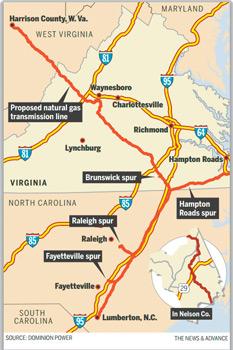 The federal government has ordered a halt to all work on the Atlantic Coast Pipeline after a panel of judges suspended two key permits for the massive project to bring natural gas from West Virginia through central Virginia and eight North Carolina counties, including Cumberland.
The federal government has ordered a halt to all work on the Atlantic Coast Pipeline after a panel of judges suspended two key permits for the massive project to bring natural gas from West Virginia through central Virginia and eight North Carolina counties, including Cumberland.
The U.S. Fourth Circuit Court of Appeals in Richmond, Virginia, vacated a permit issued by the National Park Service to allow the Atlantic Coast Pipeline to tunnel under the federally owned Blue Ridge Parkway in Virginia. The appellate court said the agency had not explained how the pipeline coincided with the mandate to conserve public lands. The court also vacated a permit issued by the U.S. Fish and Wildlife Service governing impact on endangered wildlife.
The project is also under review by the North Carolina Department of Environmental Quality. Updates on permit applications, the regulatory review process, public hearings and meetings, public comments and other related information are posted on its website. Rural property owners, primarily farmers, object to the pipeline being routed through their property. Locally, the proposed route runs parallel to I-95 through Godwin and Wade. It then crosses the interstate and runs in a southeasterly direction between Vander and Stedman to Cedar Creek and into Robeson County west of N.C. 87.
The Gardner farm in Wade, population 567, has been in the family for more than 70 years. Two generations of Gardners have raised grains, oats, barley, soybeans and more recently beef cattle on 960 acres. The Gardner
family is among several defendants in a federal lawsuit involving the Atlantic Coast Pipeline. In some instances, property is being taken through eminent domain if purchase negotiations were not successful.
ACP, LLC, which includes majority owners Duke Energy and Dominion Energy, filed several motions this month asking U.S. District Judge Terence Boyle to allow them to use eminent domain to seize portions of the defendants’ properties. What distinguishes this case is that pipeline owners want to take the property without paying the landowners first. This is known as “quick take.”
Typically, in such an instance, the party doing the seizing must pay the landowner “just compensation” for the property. The Natural Gas Act of 1938, one of the main statutes governing the project, contains no quick
take provision. “This is going to be a big fight between the gas company lawyers, the defense lawyers and environmental groups,” said property rights attorney Charles Lollar.
Landowners often say they’ve been underpaid for their property’s value. At public Atlantic Coast Pipeline forums, several property owners complained that they felt lowballed by land agents in the financial negotiations.

 How to resolve AdBlock issue?
How to resolve AdBlock issue? 








